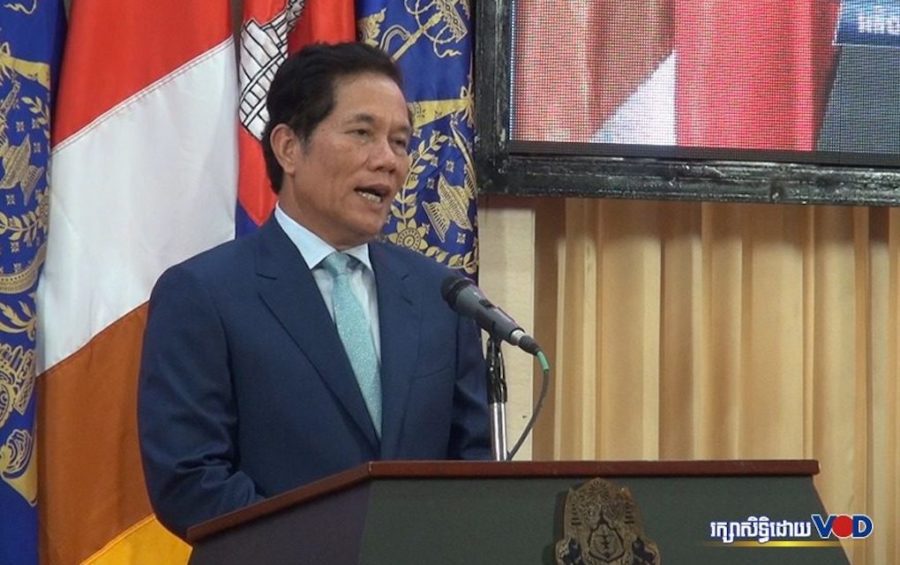Phnom Penh city governor Khuong Sreng blamed long-running land conflicts in the capital on interference from politicians and supposedly paid protesters, but some civil society members dismissed his claims as a frame-up and deflection.
Speaking at a press conference at the Council of Ministers building on Tuesday, Sreng claimed politicians often extend the life of a land dispute by hiring professional protesters, though he did not specify which politicians might be funding demonstrators.
“If it is a real land issue, it is easy to solve,” he said. “Without politicians to exploit this issue or incite [people] to create an issue, we can very easily solve [disputes].”
The city governor touted the cases of Boeng Kak and Borei Keila as achievements for Phnom Penh City Hall, saying the government had resolved the disputes in line with the law, housing rights and humanitarian principles.
Both communities saw years of violent arrests of local activists and forced evictions of residents.
Sreng accused well-known activists, including Nget Khun, known as “Mummy,” of the Boeng Kak community, and holdout protesters at Borei Keila, of taking payments from politicians to continue demonstrating.
The governor said officials were working to resolve land disputes in Russei Keo and Meanchey districts, including Boeng Tompun commune, as well as for residents along the Phnom Penh railroad line and Boeng Trabek sewage canal.
Chea Sophat, a community representative protesting a development by the Overseas Cambodia Investment Corporation (OCIC) in Chroy Changvar district, said the city governor was trying to assign blame to villagers involved in land disputes, which he felt was a threat against his community and other victims of land grabs.
Sophat, a former government official and one-star general, said that no one had asked or paid him to protest OCIC’s development. He said that residents, both in his and other cases, have protested because they were unjustly removed from land that they owned, and that the government’s mechanism for resolving land disputes has been unacceptable.
“This is a frame-up. It is a frame-up against the activism of the people who have been affected,” Sophat told VOD on Tuesday. “Long after [Sreng’s comments], people will be hesitant [to protest], adding to the issues of Covid-19 and other political pressures.”
The dispute with OCIC started in 2010 and some 67 families are still seeking a fair resolution related to 40 hectares of disputed land, Sophat said.
“We went out [to protest] and we have almost been approached with martial law and can be imprisoned at any time,” he said. “It is a problem that makes us lose spirit to demand justice.”
Phnom Penh City Hall spokesman Met Measpheakdey could not be reached for comment.
Reflecting on the Boeng Kak and Borei Keila disputes on Wednesday, Soeung Saran, executive director of land rights organization Sahmakum Teang Tnaut (STT), said they were complicated to resolve, involving the conflicting desires of developers, officials and residents.
The Boeng Kak dispute started in 2007 as the government granted a 99-year lease on 133 hectares of land including the now-filled Boeng Kak lake to developer Shukaku Inc., leading to the forced eviction of thousands of families. In 2012, the company Phanimex forced 300 families from urban housing complex Borei Keila after deciding not to build them residential housing as promised.
“What they were doing is a way of exercising their rights and freedom,” Saran said of locals demonstrating for land and housing. “People exercised their rights to access their proper residences and they implemented their freedom of expression.”
He said that some communities involved in land disputes in Stung Meanchey and Boeng Tompun communes were able to receive official land titles, but the positive resolution required a long fight from residents.
“The important [factor] is the intention of the Phnom Penh municipality and how much they intended to solve [the land conflicts],” Saran added.
Former CNRP senior official Ou Chanroth said the outlawed opposition party was regularly accused of influencing land disputes before it was dissolved in November 2017, but he claimed the party’s officials never used land disputes for their political benefit. Chanroth suggested that the governor’s comments were an excuse to avoid finding an adequate and just solution for land disputants.
“I see [protests continue] because it is an exploitation of the people,” Chanroth said. “If there is a fair exchange or solution for them, they will not cause any long-lasting problems.”
Vann Sophat, a project coordinator for the Cambodian Center for Human Rights, said that land protesters are not concerned by politics but are focused on the loss of their homes and land.
“It has to do with the land they lost without thinking about politics,” he said. “They do not think about that. They want their land back or want a solution that is acceptable for them.”
Additional reporting by Ouch Sony
(Translated and edited from the original article on VOD Khmer)












